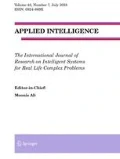Abstract
In this paper, defeasible workflow is proposed as a framework to support exception handling for workflow management. By using the “justified” ECA rules to capture more contexts in workflow modeling, defeasible workflow uses context dependent reasoning to enhance the exception handling capability of workflow management systems. In particular, this limits possible alternative exception handler candidates in dealing with exceptional situations. Furthermore, a case-based reasoning (CBR) mechanism with integrated human involvement is used to improve the exception handling capabilities. This involves collecting cases to capture experiences in handling exceptions, retrieving similar prior exception handling cases, and reusing the exception handling experiences captured in those cases in new situations.
Similar content being viewed by others
References
D. Georgakopoulos, M. Hornick, and A. Sheth, “An overview of workflow management: From process modeling to workflow automation infrastructure,” Distributed and Parallel Databases, vol. 3, no. 2, pp. 119-154, 1995.
A. Sheth, D. Georgakopoulos, S. Joosten, M. Rusinkiewicz, W. Scacchi, J. Wileden, and A. Wolf, “Report from the NSF workshop on workflow and process automation in information systems,” Technical Report, University of Georgia, UGA-CS-TR-96-003, 1996.
S. Jablonski and C. Bussler, Workflow Management: Modeling Concepts, Architecture and Implementation, International Thomson Publishing, 1996.
A. Cichocki, A. Helal, M. Rusinkiewicz, and D. Woelk, Work-flow and Process Automation: Concepts and Technology, Kluwer Academic Publishers, 1997. ISBN 0-7923-8099-1.
A. Aamodt, “Case-based reasoning: Foundational issues, methodological variations, and system approaches,” Artificial Intelligence Communications, vol. 7, no. 1, IOS Press, 1994.
P. Meier and J. Paton, Clinical Decision Making in Neonatal Intensive Care, Grune & Stratton: Orlando, Florida, 1984.
V. Marek and M. Truszczynski, Non-Monotonic Logic, Context-Dependent Reasoning, Springer-Verlag, 1993.
S. Ceri, P. Grefen, and G. Sanchez, “WIDE: A distributed architecture for workflow management,” in Proceedings of RIDE 1997, Birmingham, UK, April 1997.
G. Kappel, S. Rausch-Schott, and W. Retschitzegger, Coordination in Workflow Management Systems-A Rule-based Approach, Springer, 1998. LNCS 1364.
E. Baralist, S. Ceri, and S. Paraboschi, “Improved rule analysis by means of triggering and activation graphs,” in Proc.of the Second Workshop on Rules in Database Systems, Athens, Greece, September 1995, edited by T. Sellis, vol. LNCS 985, pp. 165-181.
N. Paton (ed.), Active Rules in Database Systems, Springer, 1999.
D.Worah, A. Sheth, K.Kochut, and J. Miller, “An error handling framework for the ORBWork workflow enactment service of METEOR,” Technical Report, Dept. of Computer Science, Univ. of Georgia, 1997.
A. Sheth, K.J. Kochut, J. Miller, D. Worah, S. Das, C. Lin, D. Palaniswami, J. Lynch, and Shevchenko, “Supporting state-wide immunization tracking using multi-paradigm workflow technology,” in Proc.of the 22nd.Intnl.Conference on Very Large Data Bases, Bombay, India, September 1996.
M. Ansari, L. Ness, M. Rusinkiewicz, and A. Sheth, “Using flexible transactions to support multi-system telecommunication applications,” in Proc.of the 18th Intl.Conference on Very Large Data Bases, Vancouver, Canada, August 1992, pp. 65-76.
A. Sheth and S. Joosten (eds.), in Workshop on Workflow Management: Research, Technolog, Products, Applications and Experiences, Athens, GA, August 1996.
N. Krishnakumars and A. Sheth, “Managing heterogeneous multi-system tasks to support enterprise-wide operations,” Journal of Distributed and Parallel Database Systems, vol. 3, no. 2, 1995.
J. Eder and W. Liebhart, “Contributions to exception handling in workflow systems,” in EDBT Workshop on Workflow Management Systems, Valencia, Spain, 1998.
D. Worah and A. Sheth, “Transactions in transactional work-flows,” in Advanced Transaction Models and Architectures, edited by S. Jajodia and L. Kerschberg, Kluwer Academic Publishers: Boston, 1997.
A. Borgida and T. Murata, “Tolerating exceptions in workflows: A unified framework for data and processes,” in Proceedings of the International Joint Conference onWork Activities Coordination and Collaboration,WACC'99, San Francisco, CA, February 22-25, 1999.
Joint Workflow Management Facility Revised Submission to BODTF RFP #2 Workflow Management Facility-CoCreate, Concentus, CSE, DAT, DEC, DSTC, EDS, FileNet, Fujitsu, Hitachi, Genesis, IBM, ICL, NIIIP, Oracle, Plexus, SNI, SSA, Xerox, http://www.omg.org/cgi-bin/doc?bom/98-06-07.
H. Ludwig and K. Whittingham, “Virtual enterprise coordinator-Agreement-driven gateways for cross-organizational workflow management,” in Proceedings of the International Joint Conference on Work Activities Coordination and Collaboration, WACC'99, San Francisco, CA, Februrary 22-25, 1999.
H. Saastamoinen, “On the handling of exceptions in information systems,” Ph.D. Thesis, University of Jyvaskyla, 1995.
M. Klein, C. Dellarocas, and A. Bernstein (eds.), Online Proceedings of CSCW98Workshop Towards AdaptiveWorkflow Systems, Seattle, WA, 1998.
F. Casati, “A discussion on approaches to handling exceptions in workflows,” in CSCW98, Towards Adaptive Workflow Workshop, Seattle, WA, 1998.
D. Chiu, K. Karlapalem, and Q. Li, “Exception handling with workflow evolution in ADOME-WFMS: A taxonomy and resolution techniques,” in CSCW98, Towards Adaptive Workflow Workshop, Seattle, WA, 1998.
J. Gray and A. Reuter, Transaction Processing: Concepts and Techniques, Morgan Kaufmann Publishers: San Mateo, CA, 1993.
C. Hagen and G. Alonso, “Flexible exception handling in the OPERA process support system,” in 18th International Conference on Distributed Computing Systems (ICDCS), Amsterdam, The Netherlands, May 1998.
M. Voorhoeve and W. Aalst, “Ad-hoc workflow: Problems and solutions,” in DEXA Workshop, 1997.
H. Wedekind, “Specifying indefinite workflow functions in adhoc dialogs,” in DEXA Workshop, 1997.
D. Strong and S. Miller, “Exceptions and exception handling in computerized information processes,” ACM Trans.Information System, vol. 13, no. 2, 1995, pp. 206-233.
Author information
Authors and Affiliations
Rights and permissions
About this article
Cite this article
Luo, Z., Sheth, A., Kochut, K. et al. Exception Handling in Workflow Systems. Applied Intelligence 13, 125–147 (2000). https://doi.org/10.1023/A:1008388412284
Issue Date:
DOI: https://doi.org/10.1023/A:1008388412284




